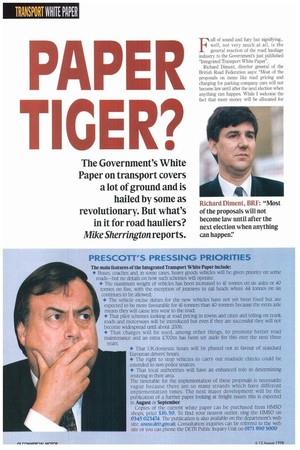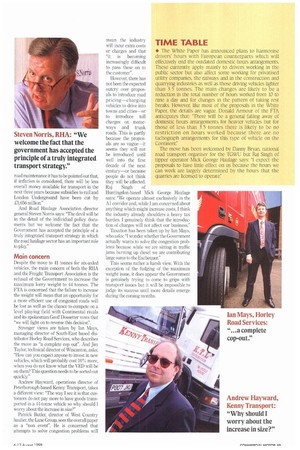The Government's White Paper on transport covers a lot of
Page 50

Page 51

If you've noticed an error in this article please click here to report it so we can fix it.
ground and is hailed by some as revolutionary. But what's in it for road hauliers?
Mike Sherrington reports.
Full of sound and fury but signifying... well, not very much at all, is the general reaction of the road haulage industry to the Government's just published "Integrated Transport White Paper".
Richard Diment, director general of the British Road Federation says: "Most of the proposals on items like road pricing and charging for parking company cars will not become law until after the next election when anything can happen. While I welcome the fact that more money will be allocated for road maintenance it has to be pointed out that, if inflation is considered, there will be less overall money available for transport in the next three years because subsidies to rail and London Underground have been cut by £1,656 million."
And Road Haulage Association director general Steven Norris says: "The devil will be in the detail of the individual policy documents but we welcome the fact that the Government has accepted the principle of a truly integrated transport strategy in which the road haulage sector has an important role to play."
Main concern Despite the move to 41 tonnes for six-axled vehicles, the main concern of both the RIIA and the Freight Transport Association is the refusal of the Government to increase the maximum lorry weight to 44 tonnes. The FTA is concerned that the failure to increase the weight will mean that an opportunity for a more efficient use of congested roads will he lost as well as the chance to compete on a level playing field with Continental rivals and its spokesman Geoff Dossetter vows that "we will fight on to reverse this decision".
Stronger views are taken by Ian Mays, managing director of South-East based distributor Honey Road Services, who describes the move as "a complete cop out". And Jim Taylor, technical director of Wincanton, asks; "How can you expect anyone to invest in new vehicles, which will probably cost 10% more, when you do not know what the VED will be on them? This question needs to be sorted out quickly."
Andrew Hayward, operations director of Peterborough-based Kenny Transport, takes a different view: "The way I see it is that customers do not pay more to have goods transported in a 14-tonne vehicle so why should I worry about the increase in size?"
Patrick Butler, director of West Country haulier, the Lane Group, sees the overall paper as a "non event". He is concerned that attempts to solve congestion problems will mean the industry will incur extra costs or charges and that "it is becoming increasingly difficult to pass these on to the customer".
However, there has not been the expected outcry over proposals to introduce road pricing—charging vehicles to drive into towns and cities—or to introduce toll charges on motorways and trunk roads. This is partly because the proposals are so vague it seems they will not be introduced until well into the first decade of the next century—or because people do not think they will be affected.
Raj Singh of Huntingdon-based Mick George Haulage says: "We operate almost exclusively in the Al corridor and, while I am concerned about anything which might increase costs, I think the industry already shoulders a heavy tax burden. genuinely think that the introduction of charges will not affect our business."
Taxation has been taken up by Ian Mays, who asks: "I wonder whether the Government actually wants to solve the congestion problems because while we are sitting in traffic jams burning up diesel we are contributing large sums to the Exchequer."
This seems rather a harsh view. With the exception of the fudging of the maximum weight issue, it does appear the Government is genuinely trying to come to grips with transport issues but it will be impossible to judge its success until more details emerge during the coming months.
PRESCOTT'S PRESSING PRIORITIES
The main features of the Integrated Transport White Paper include:
• Buses, coaches and. in some cases, heavy goods vehicles will be given priority on some roads—but no details on how such schemes will operate; • The maximum weight of vehicles has been increased to 41 tonnes on six axles or 40 tonnes on five, with the exception of journeys to rail heads where 44 tonnes on six continues to be allowed; • The vehicle excise duties for the new vehicles have not yet been fixed but are expected to be more favourable for 41-tonners than 40-tonners because the extra axle means they will cause less wear to the road: • That pilot schemes looking at road pricing in towns and cities and tolling on trunk roads and motorways will be introduced but even if they are successful they will not become widespread until about 2006; • That charges will be used, among other things, to promote better road maintenance and an extra £700m has been set aside for this over the next three years; • That UK domestic hours will be phased out in favour of standard European drivers' hours; • The right to stop vehicles to carry out roadside checks could be extended to non-police sources.
• That local authorities will have an enhanced role in determining routeing in their area The timetable for the implementation of these proposals is necessarily vague because there are so many strands which have different implementation times. The next major development will be the publication of a further paper looking at freight issues: this is expected in August or September.
Copies of the current white paper can be purchased from HMSO shops, price 06.50. To find your nearest outlet, ring the I IMS0 on 0345 023474. The publication is also available on the department's web site: www.deirgoutik Consultation inquiries can be referred to the web site or you can phone the DETR Public Inquiry Unit on 0171 890 3000
TIME TABLE
• The White Paper has announced plans to harmonise drivers' hours with European counterparts which will effectively end the outdated domestic hours arrangements. These currently apply mainly to drivers working in the public sector but also affect some working for privatised utility companies, the railways and in the construction and quarrying industries as well as those driving vehicles lighter than 3.5 tonnes. The main changes are likely to be a reduction in the total number of hours worked from 10 to nine a day and for changes in the pattern of taking rest breaks. However, like most of the proposals in the White Paper, the details arc vague. Donald Armour of the FTA anticipates that: 'There will he a general falling away of domestic hours arrangements for heavier vehicles but for those of less than 3.5 tonnes there is likely to be no restriction on hours worked because there are no tachograph arrangements for this type of vehicle on the Continent: The move has been welcomed by Danny Bryan, national road transport organiser for the TGWU but Raj Singh of tipper operator Mick George Haulage says: "I expect the proposals to have little effect on us because the hours we can work are largely determined by the hours that the quarries are licensed to operate:'












































































































